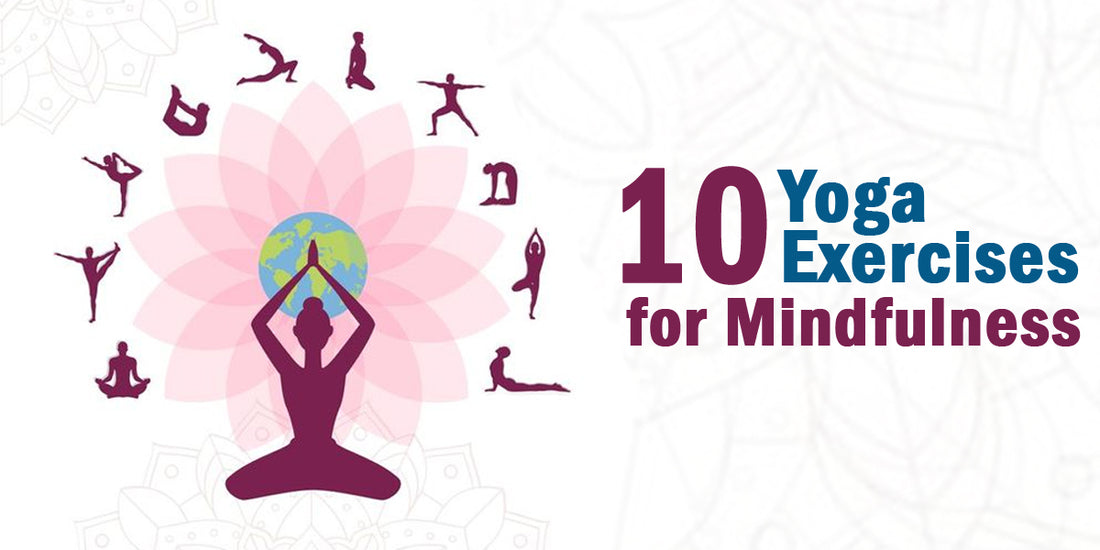
10 Yoga Exercises for Mindfulness
Share
Mindfulness has increasingly become important in today's era where everyone is in a hurry for everything, especially with the growing trend of hustle culture. Yoga has always helped people stay healthy when it comes to not only physical health but mental health as well, since it comes down to the body, mind, and spirit too. The awareness of our brain and the interaction between body movement and breath in yoga help our body to connect deeply with its mind and spirit.
A Detailed Guide to the Journey of Mindfulness
The following 10 yoga exercises can help you achieve mindfulness.
-
Balasana (also called Child's Pose): Balasana is a posture in which the person has to sit in a resting position, which gives a feeling of surrender and introspection. For this, you need to nail down on a mat with your legs folded and the arms extended forward, releasing the tension as well as stress from the body slowly. Breath deeply, settling into the position, and feel a sense of mindfulness and inner peace.
-
Tadasana (also called Mountain Pose): Tadasana is a mountain yoga pose that motivates you to stand straight and feel a connection with the earth present beneath your feet. You need to align the body in a straight position and also make sure your muscles are engaging, making you aware of their presence. This post can also help you feel grounded and rooted.
-
Adho Mukha Svanasana (dog pose facing downwards): This yoga pose consists of a posture in the shape of an inverted V. You need to breathe deeply while sitting in this position, press the palms of your hand into the yoga mat, and simultaneously stretch your body to strengthen it. Grounding feet and hands helps to ground the energy in a body and reminds us to be present in the moment.
-
Vakrasana (also called Tree Pose): In this yoga pose, you need to stand only on one leg, and the other one should be bent, taking the support of the knee of the straight leg. This poster tests your concentration as well as your balance, making you aware of your breathing and your body's senses.
-
Shava Asana (also called Corpse Pose): This yoga pose involves lying down straight on the back and is supposed to provide relaxation to the body. This is why this posture is done when the yoga session ends. Your limbs should be in an extended position, and your palms should face the sky. You need to surrender yourself, feel completely relaxed, and let thoughts in your mind completely go away.
-
Ujjayi Pranayama (also called Ocean Breath): This exercise involves breathing using a technique in which you need to make a sound that resembles that of an ocean while inhaling and exhaling through the nose. This is done in a controlled manner that helps to calm down the mind and also increases the focus on the breathing, making you feel grounded.
-
Anjali Mudra (also called Prayer Position): This gesture of hands involves keeping the hands together and making the palms press against each other. This is used to symbolize respect and unity. When you place your hands in a center position, you will feel more connected to your soul and will feel more mindfulness and gratitude.
-
Surya Namaskar (also called Sun Salutation): This yoga pose comprises many other yoga poses that make the entire body stretch and work in synchronization with the breathing. This pose increases your flexibility and strength and also increases the attention of your brain since the yoga poses flow one after the other and help you to meditate in a moving state.
-
Ardha Matsyendrasana (also called the Half Lord of Fishes Pose): This yoga poster is done while sitting in a twisted position where you need to twist your upper body while the lower body remains in a ground position. It helps to detoxify the body and keeps the spinal cord healthy. While twisting, your breath should be aligned, making it an excellent posture for mindfulness.
- Vipassana Meditation: It is a technique of meditation derived from Buddhism that asks you to focus on the sensations present in your body. The more you focus, the more aware you become of your body.
Conclusion
In order to embark on a journey of mindfulness, you need to be present and live every moment that comes your way. Being more aware of your surroundings will help you nurture a strong and deep connection with your body and everyone around you. These exercises can help you do the same with a better understanding of breathing and yoga.
FAQ:-
Q1: What is mindfulness yoga?
Mindfulness yoga combines traditional yoga poses with mindfulness meditation techniques. It focuses on being present in the moment and cultivating awareness of body and breath.
Q2: How can yoga help with mindfulness?
Yoga encourages focusing on the breath, which can help calm the mind and increase awareness of the present moment. The practice of yoga poses also promotes mindfulness by requiring attention to body sensations and movements.
Q3: What are some basic yoga poses for mindfulness?
Some basic yoga poses that can promote mindfulness include Child's Pose (Balasana), Mountain Pose (Tadasana), Warrior Pose (Virabhadrasana), and Tree Pose (Vrksasana).

